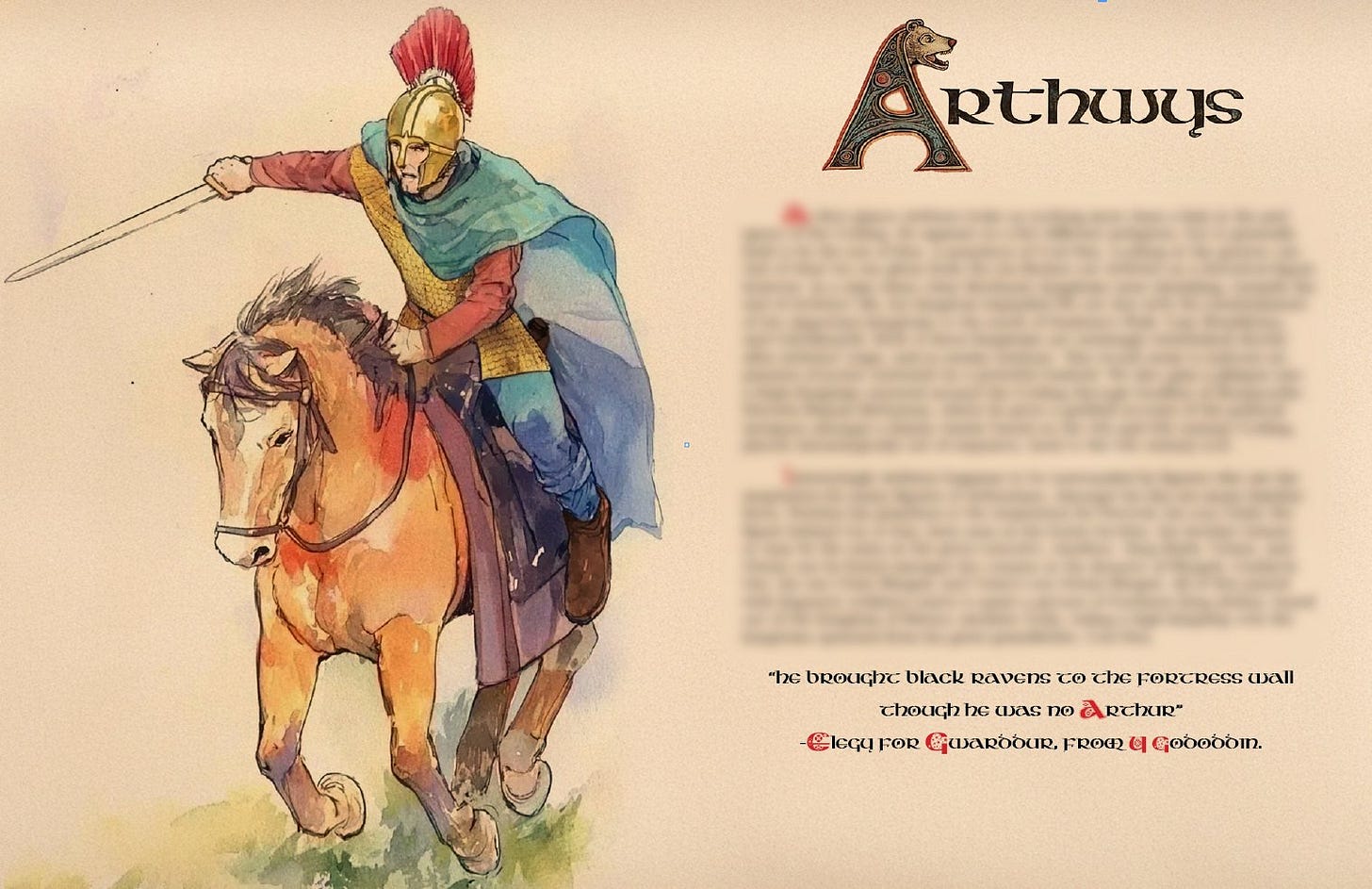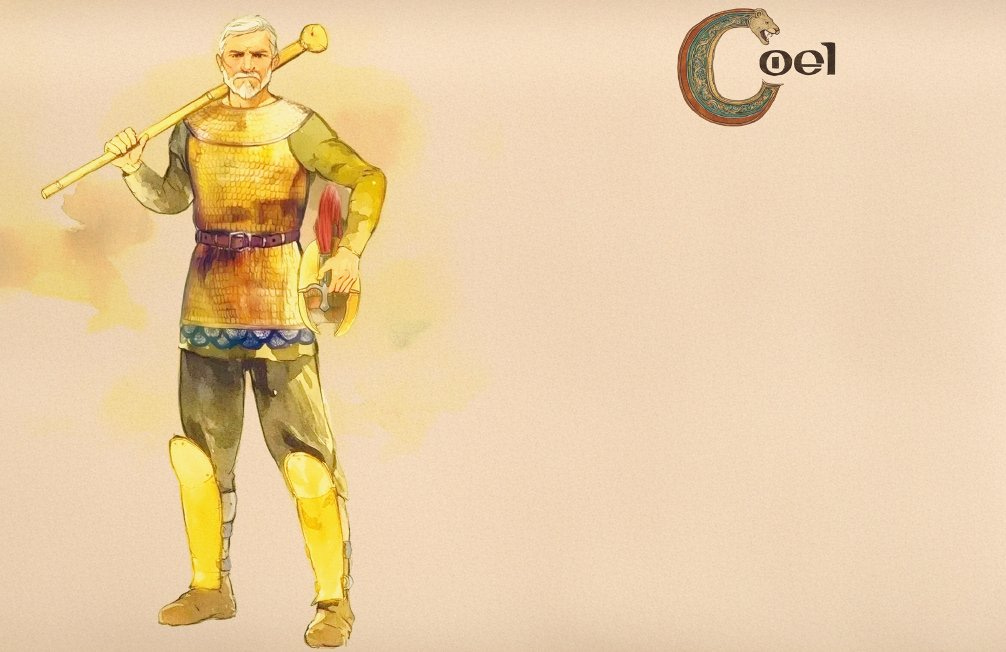Some recent findings, and an update on a new book.
Peredur, Eliffer, and my new 'Aurochs' Illustrated Guide to the Hen Ogleddd'
This is a less of a traditional article and more of a blog like post, with some recent thoughts and an update on my upcoming ‘Illustrated Guide to the Hen Ogledd’. Sometimes it’s nice to let out some of these musings stream of consciousness style, as some are hard to fully flesh out still.
Some Thoughts

My good friend p5ych0p0mp and I have been discussing Peredur, and there seems to be an enduring tradition of displacement. This is of course easily gleaned from the later romance ‘Peredur Fab Efrawg’, but is later reinforced in more detail in Y Seint Greal as p5ych0p0mp has pointed out.
“I had a castle, which was taken from me by deceit and violence, which will be restored to me by thy means, if I do not get the man I am seeking. O Lady, says Arthur, who is that one? Lord, says she, he is son of Earl Evrawc of the Vale of Camalot; and his name is Peredur. Why, says Arthur, is he called Peredur ? Because, says she, when the son was born, the father caused that name to be given him; steel spear (Par Dur); for the Lord of the Fens was warring against Evrawc, and had deprived him of much of his dominion. For that reason the name of Peredur was given to the son, to put him in mind, when he was a man, to take a steel spear; or else with the strength of a suit of steel to take vengeance on the Lord of the Fens, for what he had done to his father, in taking his land from him.”
This is an interesting snippet. Peredur of course from the pedigrees is known to be the son of Eliffer. Evrawc here is likely a remembrance of him as king of that Kingdom. ‘Peredur Fab Efrawg’ also reinforces this connection in a roundabout way. In it’s opening lines it is said that the Earl of Evrauc has seven sons. While it is not the most solid evidence, Eliffer is said to have seven sons in the poem ‘Dialogue of Myrddin and Taliesin’.
Seven sons of Eliffer, seven men when put to the test,
who in their seven divisions do not avoid seven spears.
This is not rock solid evidence but is part of a greater body linking the later Peredur of romance to the earlier tradition from the Hen Ogledd of the real Peredur and his father Eliffer. ‘Peredur Fab Efrawg’ tells us as well as that Peredur’s father was often away fighting battles, and made his living in such a way. It is extremely likely that Eliffer was his long-lived father Arthwys’ Penteulu, and as such would have been responsible for his household troops. I think this is likely remembered in the figure of Arthur’s chief groom, Elifri. A later poem by Cynddelw reinforces Eliffer’s itinerant nature calling the poems addressee “The pillar of the wanderers leading a life like Eliver”. Between this and other evidence I believe it’s safe to say that there IS a connection between the Peredur and Eliffer of the Hen Ogledd, and the later romance Peredur. The question lingers though, who was this ‘Lord of the Fens’ who drove Peredur from his ancestral seat? I would propose then that it was his elder cousin Guallauc, allied with Urien of Rheged, and likely Peredur’s uncle Ceidio, in a Coeling civil war. Elmet, Guallauc’s kingdom would have been home to much marshland, and as such the moniker ‘Lord of the Fens’ could have easily been applied to him. A reference to Guallauc attacking Ebrauc can also be found in one of the poems to Guallauc attributed to Taliesin
“Enemies were wiped out by Gwallawg.
You’re a better stockade than a pack of bears.
War by the sea from the pulse of song,
His fight was more than York’s men could endure”
Geoffrey of Monmouth’s garbled version of Eliffer, Elidurus is also dispossessed of his kingdom, imprisoned by his own sons. While the exact details don’t line up, it may be that in the now lost Northern Chronicle that Geoffrey was drawing on that Eliffer’s death was recorded, but no details as to who, and with Geoffrey not necessarily having all parts of the traditional northern narrative he displaced the narrative in time back to before Christ, as well as filling in details to make a more interesting story.
We also spoke briefly about the poem ‘Marwnat Vthyr Ben’ recently. I have been fairly convinced that Peredur’s father Eliffer is the Uther of pre-Galfridian tradition. Marwnat is often translated as ‘Death-Song’ however, this particular poem does not fit the traditional mold for other Elegies, and seems to be a boastful decree of the figures prowess. I want to draw attention to one line mainly. John Koch translates one of the opening lines below
“It is I who am a prince in the gloom”
At face value this could mean anything. Troubled times, prolonged warfare and other possibilities. I find it intriguing however, as this idea of ‘gloom’ or as it is also translated ‘darkness’ is possibly a reference to the volcanic winter of 536 and the ensuing effects of plague, famine, and literal darkness. Procopius gives us a glimpse into this ‘gloom’
—during this year a most dread portent took place. For the sun gave forth its light without brightness... and it seemed exceedingly like the sun in eclipse, for the beams it shed were not clear
Procopius
Once again, we are not on extremely solid ground here, but coupled with other evidence there is a stronger case. One such piece of evidence as Eliffer being called EleUTHERius in a corrupted triad which gives him triplets, Peredur, Gwrgi, and Arthur Penuchel. The addition of Arthur is likely a corruption of Arddun, a sister who appears in another version of the same triad, with Ceindrech similarly replacing Arthur/Arddun.
Illustrated guide to the Hen Ogledd.
Below I have attached two previews for my new book ‘Aurochs’ Illustrated Guide to the Hen Ogledd’ something I have been working on for quite a while now. I am hoping to wrap it up and have it ready for sale very soon. Within you’ll find single page entries on many of the important figures from the Hen Ogledd, the Coeling, the men of Alt Clut, Pictish kings, as well as some places, and even concepts. My paid subscribers will receive a free ebook version, I expect the final version to have over 50 illustrations, and hope you all enjoy it.
Remember to subscribe if you haven’t, and let me know if you liked this brief 'Current findings’ kind of post.





I liked this post because even though you may not have enough information for a full article, the information was still fascinating.
Looking forward to the book very much!